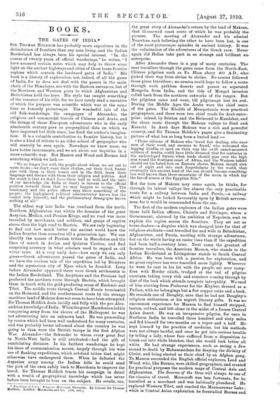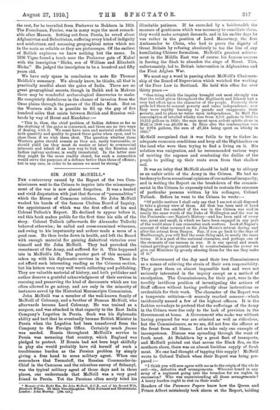BOOKS •
THE GATES OF INDIA.* SIR THOMAS HOLDICH has probably more experience in the delimitation of frontiers than any man living, and the Indian Borderland has always, been his special interest. "In the
course of twenty years of official wanderings," he writes, "I have amassed certain notes which may help to throw some light on the ancient highways and cities of those trans-frontier regions which contain the landward gates of India." His book is a history of exploration, not, indeed, of all the gates of India, for he does not deal with the passes in the main chain of the Himalayas, nor with the Eastern entrances, but of the Northern and Western posts to which Afghanistan and Behichistan bold the keys. His style has caught something
of the romance of his title, for we have rarely read a narrative of which the purpose was scientific which was at the same time so honestly picturesque. The wonderful tale of the old folk-wanderings, the campaigns of Alexander, the religious and commercial travels of Chinese and Arabs, and the doings of those European adventurers who in the early nineteenth century gave us geographical data on which we have improved but little since, has fired the author's imagina- tion. It is a valuable contribution to frontier history, but it is also a kind of tribute to an older school of geographer who will scarcely be seen again. Nowadays we know more, we have better instruments, and we set about our inquiries in a more scientific way. But Masson and Wood and Burnes had something which we lack :—
"We no longer live with the people about whom we set out to write books—we don't wear their clothes, eat their food, frater- nize with them in their homes and in the field, learn their language and discuss with them their religion and politics. And the result is that we don't know them half as well, and the ratio of our knowledge (in India at least) is inverse to the official position towards them that we may happen to occupy. The missionary and the police officer may know something of the people ; the high-placed political administrator knows less (he cannot help himself), and the parliamentary demagogue knows nothing at all."
The oldest way into India was overland from the north. Northern Afghanistan was within the domains of the great Assyrian, Median, and Persian Kings, and no road was more travelled by merchants, and soldiers, and gangs of captive slaves than the high road to Bactria. We are only beginning to find out how much better the ancient world knew the Indian frontier than ourselves till a generation ago. We can identify the names of Persian tribes in Herodotus and the lines of march in Arrian and Quintus Curtius, and find
surprising accuracy in what scholars used -to regard as old wives' tales. At a very early date—how early we can only guess—Greek adventurers passed the gates of India, and we have the curious tale of the expedition led by Dionysus and the mysterious city of Nysa which he founded. Long
before Alexander appeared there were Greek settlements in the Indian Borderland. The Assyrians and the Persians had preferred the northern route through Bactria, which brought them in touch with the gold-producing areas of Kashmir and Tibet. The middle route through Central Persia terminated on the Helmund, and the southernmost route by the strange maritime land of Makran does not seem to have been attempted. Sir Thomas Holdich deals lucidly and fully with the pre-Alex- andrian knowledge of India. When the great Macedonian led his conquering army from the shores of the Hellespont he was not adventuring into an unknown land. He was proceeding
by routes which had been well understood for many centuries, and was probably better informed about the country he was going to than .were the British troops in the first Afghan War. Alexander—the Sekunder to whom every great feat ix North-West India is still attributed—bad the gift of annihilating distance. In his farthest wanderings, he kept his lines of, communication secure, largely through his wise use of flanking expeditions, which subdued tribes that might
otherwise have endangered them. When he defeated the Aspasian army among the Indian hills he could send the pick of the oxen safely back to Macedonia to improve the
hived. Sir Thomas Holdich traces his campaign in detail with a wealth of geographical knowledge which has never before been brought to bear on the subject. He retells, too, • The Gate* of Ind:a : Being an /Iist*ricat Narrative. By Colonel Sir Thomas liolclicli..•London. Macmillan and Co. [10s. net.]
the great story of Alexander's return by the land of Makran, that ill-omened coast route of which he was probably the- pioneer. The meeting of Alexander and his admiral Nearchus, each believing the other to have been lost, is one' of the most picturesque episodes in ancient history. It was the culmination of the adventures of the Greek race. Never' again did Hellas take part in so strange and brilliant an,.
enterprise.
After Alexander there is a gap of many centUries. The next travellers through the gates came from the North-East, Chinese pilgrims such as Fa Hian about 400 A.D., wh& picked their way from shrine to shrine. No armies followed these pious travellers ; no armies could hope to follow a route- through such pathless deserts and passes as separate& Mongolia from India, and the tide of Mongol invasion rolled back from the northern outworks of the ranges. But the pilgrims came and went, till pilgrimage lost its zest. During the Middle Ages the Arabs were the chief users. of the gates. The Khalifs of Mesopotamia were practical geographers, and there were two chief roads for Arab enter- prise : inland, by Seistan and the Helmund to Kandahar, an&
the shore route through the Makran valleys to Sind and. Karachi. In Arab days Makran was a rich and powerful country, and Sir Thomas Holdich's pages give a fascinating' picture of what has so long been a buried land :— "Those citizens of Makran who 'loved fair dealing, who were men of their word, and enemies to fraud,' who welcomed the lagging khafila, or sped on their way the swift camel-mounted. soldiers of Arabia, could have little dreamed that for centuries Ira the undeveloped future, when trade should pass over the high, seas round the Southern coast of Africa, and the Western infidel should set his hated foot on Eastern shores, Makran should sink out of sight and into such forgetfulness by the world, that eventually this ancient land of the sun should become something. less well known than those mountains of the moon in which lay' the far-off source of the Egyptian Nile."
But the turn of Makran may come again, he thinks, for' through its lateral valleys lies almost the only practicable route for a railway between India and Persia,—a railway' which might be looked favourably upon by British nervous- ness, for it would be commanded from the sea.
The first of the modern explorers of the Indian gates were- those bold Indian officers, Christie and Pottinger, whom a Government, alarmed by the ambition of Napoleon, sent to explore the region across the frontiers. They set out as horse-dealers—a disguise which was changed later for that of_ religious students—and travelled far and wide in Beluchistan,. Afghanistan, and Persia, meeting with strange adventures, but on the whole having an easier time than if the expedition had been half-a-century later. Next came the greatest of frontier travellers, the American Masson, who stands to the. Indian Borderland as Livingstone stands to South Central Africa. He was born with a passion for exploration, and., no great explorer has ever travelled more lightly. Wherever he went he cast in his lot with the people, sat over camp- fires with Border chiefs, trudged at• the tail of pilgrim" caravans, taking every risk and somehow coming through by dint of the luck which attends complete intrepidity. We read of him starting from Peshawar for the Khyber, dressed as a. Pathan, with no belongings but a few copper coins and a book.
He reminds one of Doughty, save that he had not Doughty's. religious enthusiasm or his superb literary gifts. It was no.
uncommon experience for Masson to find himself stripped, beaten, robbed, and left alone in the midst of a frozen Central
Asian desert. He was an inexpensive pilgrim, for once in Northern India he travelled three hundred and sixty miles and fed himself for two months on a rupee and a half. He kept himself by the practice of medicine, but his methoda were not always tactful, and once he got into serious trouble by telling a lady, whose face suffered from a disposition to
break out into white blotches, that she would look better all white. He had strange experiences, such as seeing a Jew stoned to death by Mohammedans for denying the divinity of Christ, and being elected as their chief by an Afghan gang.
To Masson succeeded the English official explorers, Lord and Wood, who, like Burnes, were skilled geographers, and created for practical purposes the modern maps of Central Asia and. Afghanistan. The Sources of the Oxus will always be one of
the classics of travel. Moorcroft was less fortunate, for he travelled as a merchant and was habitually plundered. He explored Western Tibet, and reached the Manasarowar Lake ; while in Central Asian exploration he forestalled Burnes and the rest, for he travelled from Peshawar to Bokhara in 1824. The Frenchman, Ferrier, was in many ways the most remark- able after Masson. Setting out from Persia, he roved about Afghanistan and Beluchistan, suffering every kind of indignity and misfortune, and amassing geographical notes which are in the main as reliable as they are picturesque. Of the earliest of British explorers we know nothing but the name. In 1836 Vigne found a tomb near the Peshawar gate of Kabul with the inscription "Hicks, son of William and Elizabeth Hicks." He judged the inscription to be a hundred and fifty years old.
We have only space in conclusion to note Sir Thomas Holdieh's summary- We already know, he thinks, all that is practically needful about the gates of India. There are no great geographical secrets, though in Balkh and in Makran there may be wonderful archaeological discoveries to make.
He completely disbelieves in the chance of invasion from the Oxus plains through the passes of the Hindu Kush. But on the Western side it is possible to fill up the gap of five hundred miles that exists between British and Russian rail- heads by way of Herat and Kandahar :—
" This is, then, the chief problem of Indian defence so far as the shutting of the gates is concerned, and there are no two ways of dealing with it. We must have men and material sufficient in both quantity and quality to guard these gates when open, and to close them if we wish them shut. The question whether these Western gates should remain as they are, easily traversable, or should yield (as they must do sooner or later) to commercial interests and admit of an iron way to link up the Russian and Indian railway systems, is really immaterial. In the latter case they might be the more readily closed, for such a connection would serve the purposes of a defence better than those of offence; but in any case, in order to be secure we must be strong."







































 Previous page
Previous page